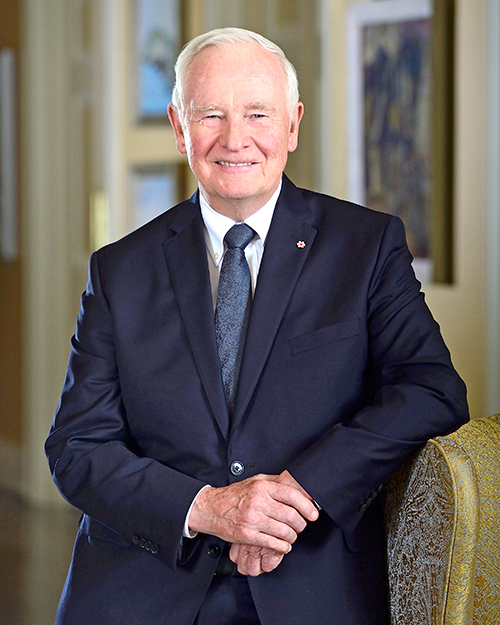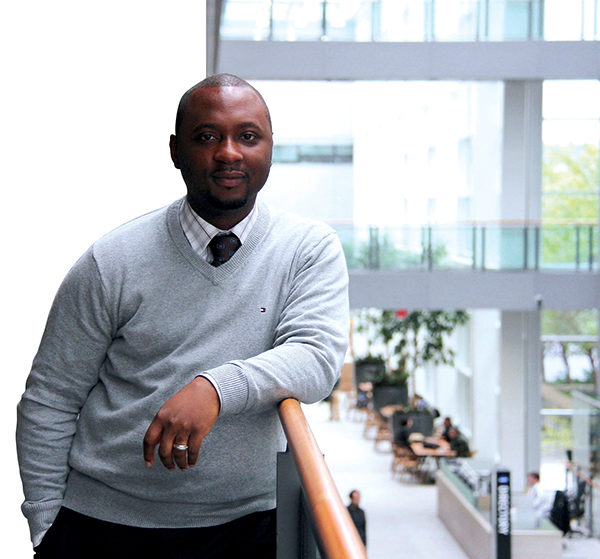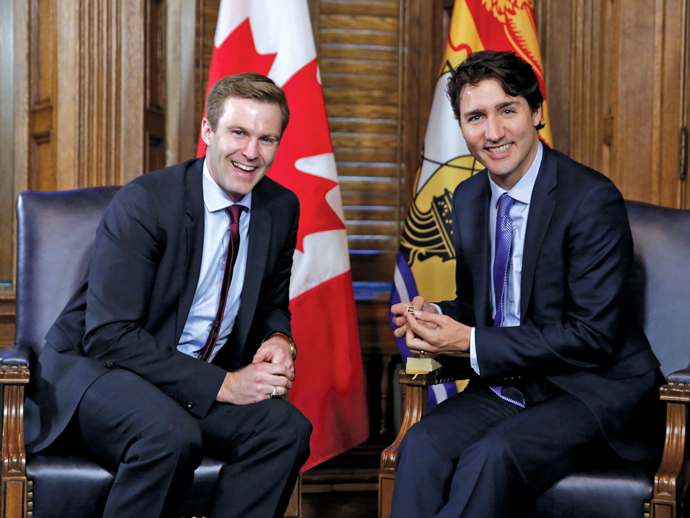The motto of His Excellency the Right Honorable David Johnston, Governor General of Canada, is contemplare meliora, meaning “to envisage a better world.” It refers to his belief in “the abilities of all Canadians to imagine and create a smarter, more caring nation and contribute to a fairer, more just world.”

The Queen’s representative and Commander in Chief of Canada knows how important a culture of innovation and openness is to that mission. It’s why the former Harvard hockey star has launched a new national innovation awards program, and why he feels so strongly about fostering policies that support ingenuity and inclusion. Innovation is part of a natural sequence that begins with discovery and invention, he told Site Selection in an interview during a May 2016 visit to Atlanta, before invoking some more Latin.
“Discovery comes from the Latin verb discooperīre, which means to reveal,” said the former University of Waterloo president and McGill University vice-chancellor. “Invention comes from the Latin verb invenīre, which means to arrive at or come to.” It’s a matter of finding new applications for already discovered ideas, and of opening the channels for R&D to get commercialized without too much red tape or interference. Take the typical arrangement whereby any discovery or intellectual property created on a campus automatically belongs to the university, which typically strikes an agreement with the professor.
“At Waterloo, that made it difficult,” said Johnston, “so the university owns no IP. It belongs to the professors. I believe in that. Universities are not good at commercialization, nor should they attempt to be. They should be boundless, led by curiosity, and should not be constrained by guarding secrets.”
The challenge is to get discovery, invention and innovation all together in the same place.
2016 Canadian Competitiveness Rankings
- Ontario Ministry of Economic Development and Growth
Hon. Brad Duguid, Minister
www.investinontario.com - Opportunities NB
Stephen Lund, CEO
onbcanada.ca - Invest Québec
Pierre Gabriel Côté, President and CEO
www.InvestQuebec.com
“Looking across the landscape in Canada, we see different areas that have clustered these,” he said, highlighting the Toronto-to-Waterloo corridor Toronto’s MaRS Discovery District as national stars.
That is precisely what Site Selection does each year in arriving at Canada’s Best Locations, based on where companies are investing in new or expanded facilities. Not only are Greater Toronto and Waterloo-Kitchener-Cambridge among the top 10 regional performers in our annual evaluation, but the Province of Ontario and its Ministry of Economic Development and Growth this year take home the Canadian Competitiveness Award for being the top-performing province in economic development. The award is based on tallies and per-capita calculations related to corporate facility location and expansions investments tracked over a 12-month time period by Site Selection’s Conway Projects Database.
Ontario has a natural advantage, being home to 13.8 million people — more than 38 percent of the entire population of Canada. But the provincial government doesn’t just sit back and wait. Over the April 2015-March 2016 period, Site Selection tracked nearly 100 projects, from GE’s engine plant in Welland to Bioamber in Johnston’s hometown of Sarnia to Canadian global giant Magna’s investment in Greater London and 3M’s in Brockville. In August alone, the province announced in the space of one week that:
- The Ministry of Economic Development and Growth will strengthen its already successful Investment Ready: Certified Site program (the only one of its kind in Canada).
- The Ministry of Research, Innovation and Science will award C$51 million across an array of research programs.
- Premier Kathleen Wynne will lead her first business mission to Japan and South Korea. She will be the first Ontario Premier to visit South Korea in 30 years and the first to visit Japan in a decade.
- Wynne and Michigan Governor Rick Snyder signed an agreement to collaborate on attracting automotive R&D and investment.
Distinguished by Diversity
The stars dotting the Canadian economic development landscape are doing the hard work of cultivating an environment conducive to doing business and to creating a future for Canadians and their families — including the waves of new Canadians from other lands, such as 25,000 Syrian refugees.
“Our response to the Syrian refugee crisis was to me very heartwarming, because it reinforced fundamental values,” Governor General Johnston said. “We have seen immigration as a positive force that has brought new waves of energy to the country.” Those immigrants have also brought a fierce desire that life should be better for their children. “Children of immigrants today have substantially higher education than folks that have been in Canada for two to four generations,” he said. “That has served Canada well.”

A focus on inclusiveness combined with a high-quality public education system, he said, makes for a promising recipe.
“Those ingredients make for the basis of innovation and healthy communities,” he said, a point he later expounded on to Atlanta leaders. “How do we focus on learning, and make it available to all of our people?” he asked. As historians look back on this period of history, he said, it will be viewed as the first time societies weren’t measured by “the size of their GDP or armada, but by how well we can develop the talent of all of our people.”
He sees development on a larger scale springing from that individual development process, calling on the examples of his five daughters’ exposure to different cultures and socio-economic strata as they grew up. Today, “one speaks Arabic, two speak Russian and one speaks Chinese,” he said. As a result of diversity, he said, his children are curious, tolerant, engaged and empathetic — qualities that mesh well with the curiosity, capability, creativity, collaboration and celebration he sees as crucial to sparking an innovation culture. He then borrowed an image from Thomas Jefferson: the candle of knowledge.
“When you light your candle from me, my light does not diminish,” Johnston intoned.
Each year Site Selection salutes the regions lighting up Canada’s economy in the Top 10 Canadian Economic Development Groups representing regions or municipalities. In addition to Conway Projects Database calculations, we pay close attention to such subjective but tangible factors as regional partnership, proactive programming and legislation, and quality data and Web resources.
City of Brantford Economic Development
John Frabotta, Director
Significant Projects: Mitsui High-tec (Canada) Inc. (auto parts); Solar Ship (aircraft); KindCann (medical marijuana)
Programs & Initiatives: By pursuing the Smart City – Intelligent Community designation, launched in 2013, Brantford aims to “create prosperity, stability and cultural meaning in a global economy where jobs, investment and progress increasingly depend on a broadband economy.” EmployerOne workforce survey; updated economic development strategy; 743 business consultations completed by the Brantford-Brant Business Resource Enterprise Centre.

Did You Know? Just an hour southwest of Toronto in the heart of the Golden Horseshoe, Brantford boasts a population of 94,000 that is expected to grow to 115,000 by 2020. The city features one of the best urban trail systems in Canada, with over 40 km. (25 miles) of Trans Canada Trail meandering through the community and along the historic Grand River.
City of Hamilton Economic Development (Ont.)
Neil Everson, Director of Economic Development & Real Estate Division
Significant Projects: G3 Canada (agribusiness); Pipeline Studios (software); Fibracast (water treatment membrane manufacturing); Shawn & Ed Brewing Co.
Programs & Initiatives: The Hamilton Niagara Region was pitched during the July 2015 Pan Am Games to high-potential business leaders; among the resulting opportunities, a partnership was established to develop a National Sports Analytics Centre of Excellence in the Hamilton-Niagara Corridor. US Steel Canada is aiming to all or part of its current 800+ acres [324+ in hectares] of industrial land on Hamilton’s harborfront. The “One-Stop” helps businesses build, expand, develop and start-up faster and more efficiently. IBM & HHS announced a new center in downtown Hamilton focused on healthcare innovation.
Did You Know? The Synapse Life Sciences Consortium showcases Hamilton’s premier life sciences cluster, which includes such institutions as McMaster University, Mohawk College, Hamilton Health Sciences and St. Josephs Healthcare.
London Economic Development Corporation (Ont.)
Kapil Lakhotia, President & CEO
Significant Projects: Magna International (auto parts); Presidium Equipment (sporting goods); Starlim North America (plastics); Farm Boy 2012 (produce warehouse)
Programs & Initiatives: “To remain competitive and attract investment the city of London always has a stock of at least 200 acres [81 in hectares] of fully serviced city-owned industrial land that is available” and free of development charges, says London EDC. The organization works with other London agencies including Campus Linked Accelerators at Western University and Fanshawe College, Small Business Centre, TechAlliance, Stiller Centre and others. Strategic initiatives include a last-mile fiber-optic connection pilot program; food and beverage programs to support agri-food entrepreneurs; and talent development support for SMEs.
Did You Know? The headquarters of the Canadian division of 3M are located in London, and both the Labatt and Carling breweries were founded there.
Greater Moncton Economic Development
Eric Mourant, President & CEO
3plus.ca
Significant Projects: WestJet Airlines (call center); Advanced Heli Core (aircraft); BMM Testlabs (gaming testing)
Programs & Initiatives: There are an estimated 1.4 million people living within a 2.5-hour drive of Greater Moncton — the largest population catchment area of any urban center in Atlantic Canada. The industrial park infrastructure includes Caledonia Industrial Estates, Moncton Industrial Park and Dieppe Industrial Park, due to expand soon near Greater Moncton International Airport.
Did You Know? Samantha Robichaud from Moncton was one of the punk-rock, tap-dancing fiddlers who stole the show at opening ceremony of the 2010 Winter Olympics in Vancouver.
Montréal International
Hubert Bolduc, President & CEO
Significant Projects: LISIAerospace Canada; Medtronic CryoCath; ABB (industrial controls); Nestlé Skin Health
Programs & Initiatives: A master’s degree in aerospace engineering is offered jointly by six universities in Québec and the Aerospace Embedded Systems Engineering program. For a fifth consecutive year, Montréal in July was ranked first in the Americas for international events, according to the Union of International Associations. The city hosted 108 international events in 2015.
Did You Know? The Intelligent Community Forum in June 2016 named Montréal as the 2016 Intelligent Community of the Year.
Québec International
Carl Viel, President & CEO
Significant Projects: Olympus (device manufacturing); Ubisoft and Gearbox Software (video games); Microsoft (cloud services); Atlas Medic (HQ relocation); Medicago (vaccines)
Programs & Initiatives: 2015 was a record year for FDI, both for reinvestment, primarily in the technology industry. Québec International was involved in projects worth over $500 million in 2015, but total FDI for the region exceeded $670 million. Québec International in 2015 led 13 prospecting and promotional missions and also spearheaded initiatives in Asian cities during missions with its Canadian partners. These activities generated meetings with over 265 businesses and potential investors. In February 2015, Québec International and the City of Québec co-launched Le CAMP, a high-tech incubator/accelerator.
Did You Know? The 2016 edition of KPMG’s Competitive Alternatives confirms that Québec City continues to be ranked No. 1 worldwide among comparably sized urban areas (i.e. over 500,000 inhabitants in mature markets) in terms of its competitive cost advantages. According to this biennial study, it is 16.1 percent cheaper to set up a company and do business in Québec City, compared with the US average.
Invest Toronto
Terrie O’Leary, Interim President & CEO, EVP of Operations
Significant Projects: Tata Consultancy (office); Biolab Sanus Farmacêutica (R&D); Lowe’s (DC in Milton); PT Studios (film production); Soti (software); TD Bank (HQ)
Programs & Initiatives: Toronto’s Imagination, Manufacturing, Innovation and Technology (IMIT) business incentive has recently been reviewed and amended to increase the incentive level for eligible applicants constructing new buildings or substantially renovating existing buildings in Employment Districts. Launching later this year, Toronto Global merges the operations of the Greater Toronto Marketing Alliance and Invest Toronto.
Did You Know? According to the 2016 Branham 300 Report, nearly a quarter of the top 250 Canadian tech firms are based in Toronto. Toronto also is home to one of the largest financial services talent concentrations in the Americas, employing over 251,000 people across the region. This represents 70 percent of Ontario’s and 36 percent of Canada’s sector employment.
Vancouver Economic Commission
Ian McKay, CEO
Significant Projects: Sony Pictures Imageworks Canada (HQ); ACL Services (HQ); Columbia Containers (logistics); Orgaworld Surrey (waste management); CMW Insurance Services
Programs & Initiatives: The Vancouver Economic Commission is focused on the key sectors of tech, digital entertainment & interactive and green businesses. Regional transportation-related investment commitments total more than $20 billion. According to Stronger Together: The Strengths of Canada’s Four Global Financial Centres, (Vancouver, Toronto, Calgary and Montreal), facilitating FDI is a core strength for Vancouver, the second-highest-rated activity by survey respondents after wealth management. The area’s credit union system was called the most significant contributor to growth in Vancouver’s financial services sector, after the rise of Asia as an economic power and Canada becoming a settlement hub for the renminbi.
Did You Know? More than 100,000 international students choose BC, recently ranked as having the third-best education system in the world. In Vancouver, 60 percent of K-12 students speak a language other than English at home.
Waterloo Region Economic Development Corporation
Tony LaMantia, CEO
Significant Projects: CSG Apparel; Grand River Foods; Precision Resource Canada; Shopify; Google Canada
Programs & Initiatives: The C$55-milllion hardware technology workspace Catalyst137, announced in June 2016, bills itself as “the largest Internet of Things innovation center in the world.” The Communitech Hub space for startups opened an expanded facility in July 2016, backed by $1.2 million from the province, when space became available after Google moved to a larger space nearby.
Did You Know? The University of Waterloo — known for giving birth to the Blackberry, its research park and its unique work/learn continuum — was born 60 years ago because the head of a major tire company needed more engineers.
Economic Development Winnipeg
Dayna Spiring, President & CEO
www.economicdevelopmentwinnipeg.com
Significant Projects: SkipTheDishes (online food-ordering and delivery); GE Aircraft Engines; Santorini Dairies; Standard Aero Ltd. (aircraft); Black Feather Holdings (apparel)
Programs & Initiatives: The federal government through Western Economic Diversification, provided $5 million in financial support to the Orthopaedic Innovation Centre (OIC) to develop an Advanced Digital Manufacturing Hub. A new water treatment plant, reservoir and delivery infrastructure for CentrePort Canada valued at $43 million is now in place. The RBC Convention Centre Winnipeg is undergoing a major expansion. CentrePoint, the first major private commercial development in Winnipeg’s downtown core in years, opened its doors in 2015.
Did You Know? According to the Conference Board of Canada, Winnipeg’s real GDP grew by 2.3 percent in 2015, the second-strongest economic growth among metro areas in Western Canada (behind Vancouver) and the fourth-strongest nationally. Employment growth of 3.2 percent overall was the highest among all Canadian metro areas and a 20-year high.

